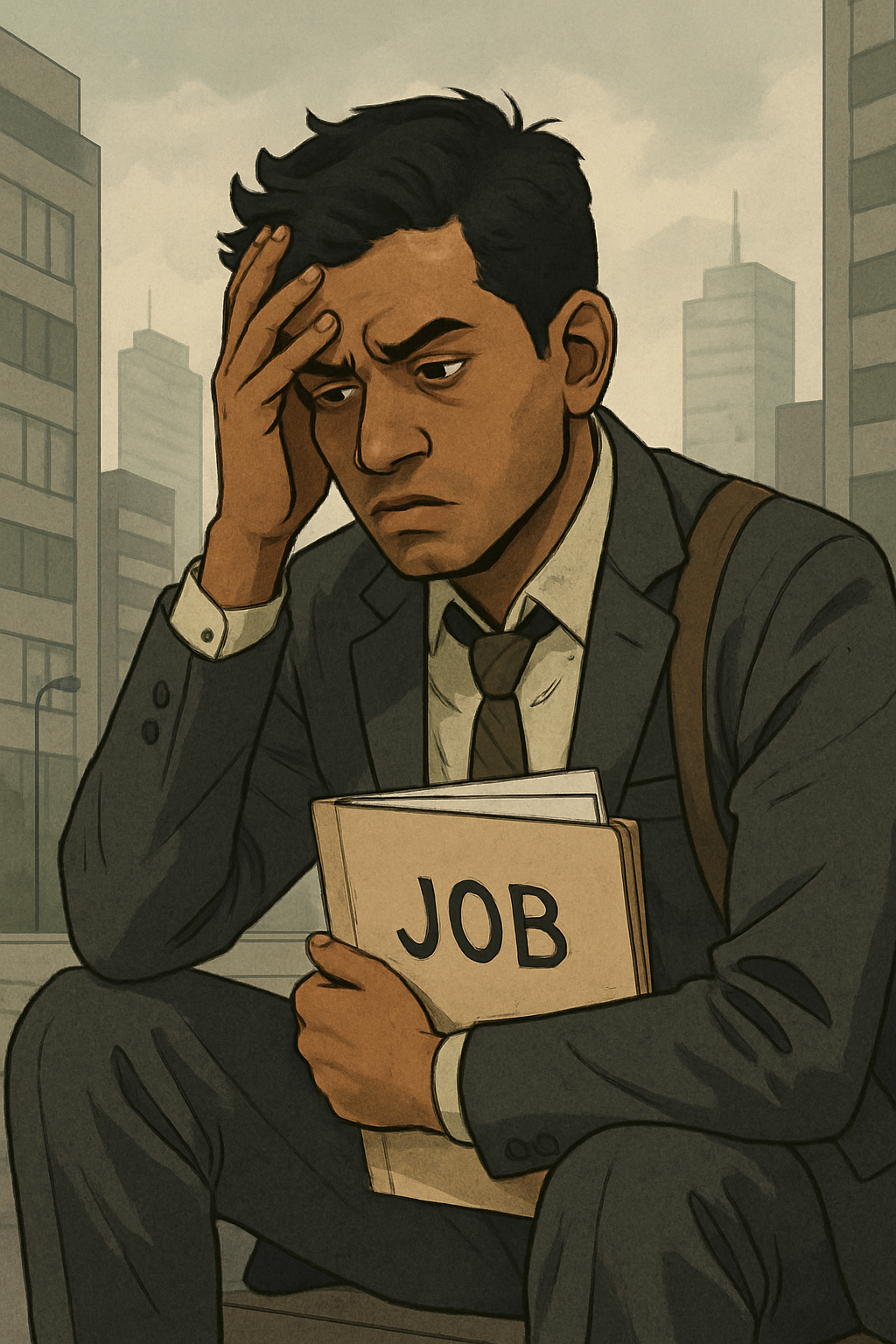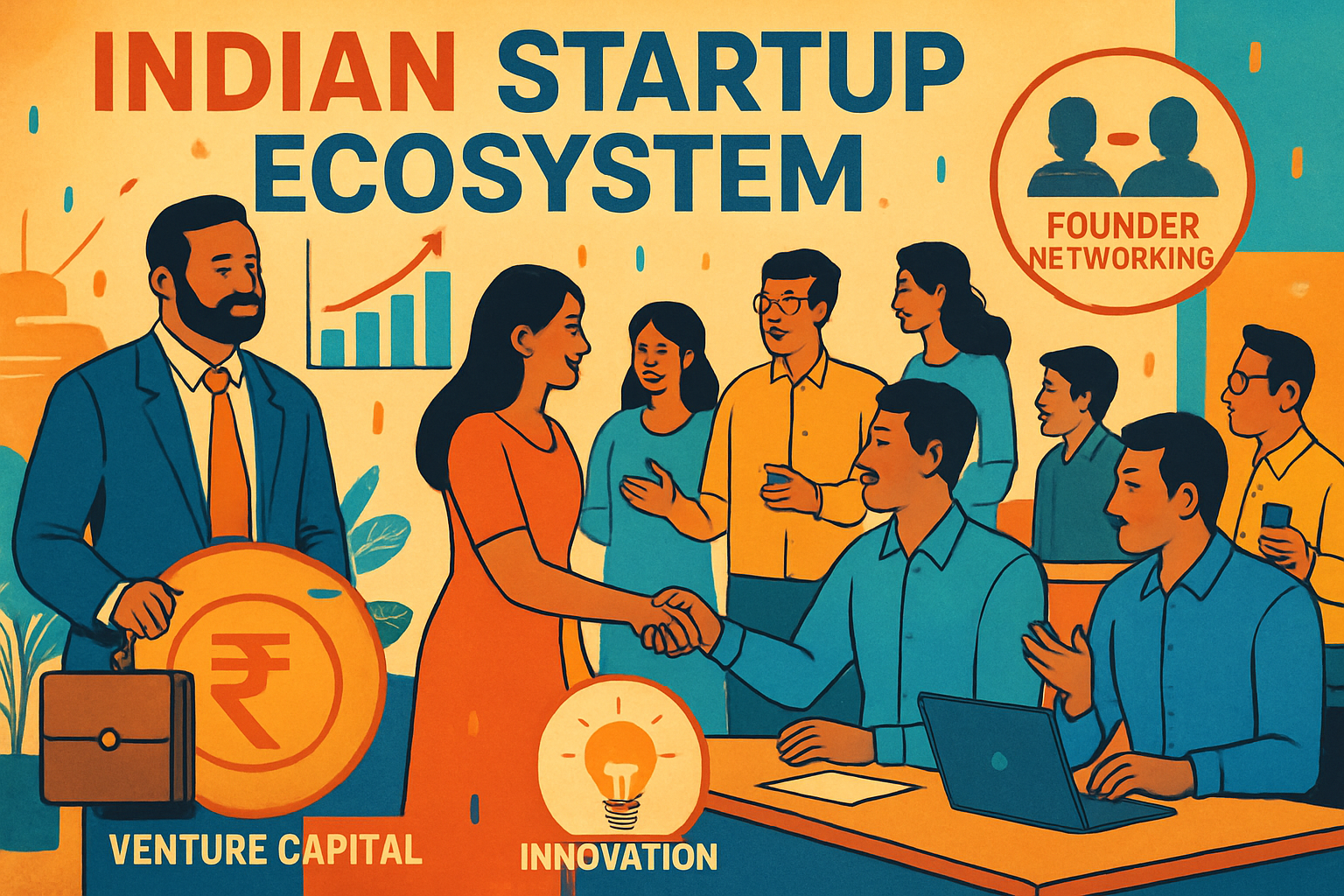In the bustling landscape of Indian entrepreneurship, many startup founders dream of innovation, market disruption, and the thrill of building something from nothing. Yet, the road to success is often littered with setbacks, especially in a volatile ecosystem where funding is scarce and competition fierce. A recent example echoes loudly: a former Indian startup founder, after closing his healthy food and beverage enterprise due to funding dry-up and internal differences, now finds himself caught in an unforeseen struggle – the arduous job market. Despite positive interview feedback, he repeatedly hears his profile is “too founder-y,” neither fitting traditional corporate roles nor niche domains. This story sheds light on the often overlooked post-failure phase that many entrepreneurs face, highlighting the tension between resilience and harsh realities.
The challenges of repositioning oneself after a startup setback expose a wider narrative about entrepreneurship in India. Founders who once wore all hats—marketing, operations, finance—must now reorient to structured corporate environments, often without the external funding or networking support that once buoyed their ventures. While Indian startups continue to generate excitement within venture capital circles and foster innovation hubs, the personal toll on founders underscores the fragility behind success façades.
Networking and business development, cornerstones of startup growth, paradoxically become harder to leverage once an enterprise shuts down. As aspiring entrepreneurs seek fresh opportunities, many encounter the unyielding gatekeepers of conventional employment. This friction calls attention to systemic gaps in talent integration and opportunity alignment for startup veterans, challenging the ecosystem to reconsider how resilience, adaptability, and unique founder skillsets can be accommodated.
Across social platforms, candid conversations now emerge, as founders share their narratives and advise one another on navigating post-failure transitions. This communal sharing not only fosters empathy but also prompts critical reflection on infrastructure that supports innovation beyond the initial startup phase. Such discourse is vital in an India eager to cement its place on the global entrepreneurship map, balancing optimism with realism. In this complex interplay of dreams deferred and tenacity tested, the search for new opportunities serves as both a personal and systemic reckoning.
Challenges Faced by Indian Startup Founders in the Aftermath of Setbacks
Entrepreneurship involves constant upheavals, and Indian startup founders often grapple with multifaceted challenges when their ventures fail or pause indefinitely. The trajectory from leading a company to seeking employment as an employee can be unexpectedly difficult, enveloped in social, professional, and psychological obstacles.
One primary hindrance is the identity shift. Founders accustomed to holistic control of their business find it jarring to transition into a hierarchical and structured work environment. Corporate employers often perceive such profiles as “overqualified” or “too founder-y,” unsure how to integrate entrepreneurial, multifarious skills into clearly defined roles.
- Mismatch of expectations: Employers seek domain-specific expertise whereas founders possess broad, cross-functional experience.
- Stigma of failure: Despite failure being a recognized aspect of entrepreneurship, recruiters sometimes unconsciously undervalue candidates with shuttered startups.
- Lack of formal credentials: Startup founders may have gaps in sectors highly valued by corporations, such as structured finance or standardized marketing certifications.
- Funding Environment: Economic slowdowns and reduced venture capital inflows, as with current market trends reported in the Indian Unicorn Startup Slowdown, exacerbate these challenges.
The Indian startup ecosystem is evolving, but the reality for many post-setback founders is a job market that remains unforgiving. Those like the founder who ran a food and beverage startup often resort to leveraging personal networks and seeking direct connections with company founders to bypass traditional hiring filters. A Reddit post recounting such a founder’s journey resonated deeply, evoking numerous responses from peers who have similarly struggled.
| Challenge | Explanation | Impact on Founder |
|---|---|---|
| Perceived Overqualification | Employers view founder skills as too broad or advanced for entry-level roles. | Leads to rejection or lack of callbacks despite qualifications. |
| Non-linear Career Trajectory | Startups involve multi-role engagement unlike structured corporate paths. | Difficulty in framing resumes and interviews for traditional roles. |
| Funding Environment | Decreased venture capital availability limits new opportunities and investments. | Limits growth of new startups; forces former founders to seek jobs. |
| Network Challenges | Startup communities may not translate well into corporate networking. | Reduced access to structured roles. |
Examples from startups like FleetX and software firms illustrate the nuanced funding and market dynamics influencing founder pathways and opportunities.

Strategies to Overcome Post-Startup Setback Barriers
Despite the challenges, Indian founders can devise strategies to recenter and leverage their entrepreneurial skills toward new opportunities:
- Skill Rebranding: Translate diverse roles into domain-specific expertise with measurable outcomes.
- Networking Intensification: Engage with founders and decision-makers directly, bypassing HR bottlenecks.
- Continuous Learning: Acquire certifications or training in niche areas valued by employers for credibility.
- Opportunity Diversification: Consider consulting, advisory roles, or fractional leadership positions to keep the entrepreneurial spirit alive.
- Mental Resilience: Build emotional strength to counter rejection and keep adapting to the changing job ecosystem.
These approaches, combined with active participation in forums and startup communities, can help founders regain footing in the evolving market. For instance, consulting opportunities in SaaS companies, like those mentioned on the emerging SaaS startups 2025 report, provide viable alternatives to traditional roles.
Networking and Resilience: Unlocking Hidden Opportunities for Indian Entrepreneurs
In the world of startups, networking is not just a buzzword but an essential tool for business development and resilience. Indian startup founders who face setbacks can turn to their networks not only to secure new job opportunities but also to find partners, mentors, or even co-found new ventures.
The challenge is that post-failure, founders often feel isolated, as their previous connections may be funding-focused or clientele-oriented, and less helpful when seeking jobs. Therefore, rebuilding and expanding relevant networks is crucial.
- Founders’ Circles: Engage with groups or forums of current and former startup founders. Platforms such as LinkedIn groups and founder meetups offer peer support.
- Investor Connections: Venture capitalists and angel investors can provide introductions to portfolio companies hiring or new ventures looking for co-founders.
- Industry Events: Attending conferences focused on emerging technologies like AI, SaaS, or renewable energy can yield fresh contacts and insights.
- Mentorship Programs: Participating as both mentors and mentees helps maintain relationships and reputation within entrepreneurial ecosystems.
- Online Platforms: Specialized job boards and social channels where startup experience is valued increase chances of discovering suitable roles.
The resilience of founders can be greatly enhanced by actively cultivating relationships and being flexible in career strategies. For example, after shutting down a food startup, engaging with SaaS firms showcased in the fractional CMO firms for B2B SaaS market opened new doors for many.
| Networking Approach | Benefits | Example Application |
|---|---|---|
| Founders’ Circles | Mutual support, shared opportunities, empathy | Joining Mumbai startup founder groups |
| Investor Connections | Access to hiring within funded companies | Connecting through Indian venture capitalists |
| Industry Events | Learning trends, meeting new partners | Attending AI startup summits |
| Mentorship Programs | Network influence, reputation boost | Becoming a mentor at incubators |
| Online Platforms | Targeted job openings, flexibility | Applying via startup-specific job portals |
One social media post gaining traction on Twitter underscores the power of community, where founders share realities and offer practical advice, strengthening the resilience culture within Indian entrepreneurship ecosystems.
The Role of Venture Capital in Shaping Opportunities for Indian Startup Founders
Venture capital (VC) continues to be the lifeblood of Indian startups, funding innovation and growth across sectors, including SaaS, AI, and healthy food industries. However, the fluctuations in VC appetite significantly affect founders’ futures.
The current trend, as seen in recent reports on India’s startup funding slowdown, shows caution among investors, leading to fewer fresh rounds and increasing the pressure on startup founders. Without external capital, businesses stall, founders exit, and the challenge to find traditional employment increases.
- VC Funding Impact: Startups like FleetX and others received significant later-stage funding enabling scaling and hiring.
- Startup Valuations: Indian AI and SaaS startups have seen mixed valuation trends, with some like ClickHouse raising high-profile rounds and others struggling.
- Exit Opportunities: Favorable acquisition and merger environments, such as Collibra acquiring Raito, offer alternative career pivots for founders.
- Funding Slowdown: Founders facing funding delays often confront tough choices including shutting down, as many have shared on social media forums.
| VC Trend | Effect on Founders | Example |
|---|---|---|
| Increasing Late-Stage Funding | Job creation, career opportunities in startups | FleetX Series C funding |
| Funding Slowdown | Founder exits, job search challenges | Indian Unicorn Startup Slowdown |
| Acquisitions and M&A | New leadership roles in merged companies | Collibra Acquires Raito |
| Diversified VC Interest | Sector-specific opportunities in AI and SaaS | Grammarly 1B AI investment news |
Understanding and navigating these funding currents is crucial for founders plotting second acts, as venture capital is both an enabler and a gatekeeper within the Indian ecosystem.

Innovating Beyond Failure: How Indian Founders Can Create New Opportunities Post-Setback
The entrepreneurial journey rarely ends with a single startup. Innovation often springs from the ashes of failure, as resilient founders recalibrate and pursue new ventures or alternative business models.
The evolving Indian ecosystem provides avenues for innovation beyond traditional startup models, encouraging founders to explore sectors such as SaaS, AI-driven platforms, and even B2B services, which offer promising growth and adaptability.
- Pivoting Business Models: Founders utilize lessons from previous efforts to explore more scalable or niche markets.
- Leveraging Technology: Application of AI and automation, such as those seen in Snyk AI platform launches, accelerates innovation potential.
- Startup Accelerators and Competitions: Programs like Startup Battlefield 200 offer mentorship, funding, and validation.
- Collaborative Ventures: Partnering with other startups or established companies to co-develop products and share resources.
- Social Entrepreneurship: Pursuing impact-driven startups addressing health, education, or environment in line with national priorities.
| Strategy | Benefits | Examples from Indian Ecosystem |
|---|---|---|
| Pivoting Models | Higher chance of product-market fit | Healthy food founders exploring SaaS or tech-enabled supply chain |
| Technology Leverage | Faster innovation and competitive edge | AI startups like fastest growing AI startups in India |
| Accelerator Programs | Funding and mentorship access | Applications to global competitions |
| Collaborative Ventures | Resource sharing, risk mitigation | Joint ventures in logistics or SaaS solutions |
| Social Entrepreneurship | Mission-driven returns and social impact | Health tech initiatives addressing nutrition |
Embracing such innovation-focused action not only restores a founder’s career momentum but also enriches the broader Indian startup ecosystem, aligning entrepreneurship with resilience and purpose.
Understanding the Psychological and Emotional Journey of Startup Failure for Indian Entrepreneurs
Behind the statistics and economic data lies the deeply personal narrative of Indian startup founders grappling with the emotional aftermath of failure. Entrepreneurship demands passion, risk tolerance, and mental fortitude; setbacks can shake one’s identity profoundly, impacting confidence and motivation.
The founder’s anonymous Reddit post encapsulates this reality—feeling stuck between roles, facing social stigma, and seeking acceptance. Recognizing and addressing these emotional challenges is vital for both individual well-being and ecosystem sustainability.
- Emotional Rollercoaster: Experiences fluctuating highs of hope and lows of disappointment.
- Social Isolation: Perceived as “failed,” leading to withdrawal from professional networks.
- Need for Support Systems: Therapy, peer groups, and mentorship to rebuild resilience.
- Identity Reconstruction: Moving beyond “founder” to new professional roles.
- Motivation for Reinvention: Harnessing lessons learned to fuel new pursuits without fear of stigma.
| Psychological Aspect | Challenge | Support Strategy |
|---|---|---|
| Emotional Highs & Lows | Hopelessness and doubt post-failure | Peer support groups, coaching |
| Social Stigma | Fear of judgment, isolation | Open dialogue forums, mental health advocacy |
| Identity Crisis | Difficulty redefining self beyond founder | Career counseling, mentorship |
| Motivational Decline | Loss of drive to pursue new ventures | Goal setting, success stories, inspiration |
Several organizations and communities have begun developing mental health initiatives targeted at entrepreneurs. Increasing attention to this dimension signals maturation in India’s startup culture, recognizing that resilience is as much psychological as it is professional.
Frequently Asked Questions About Indian Startup Founders’ Post-Setback Opportunities
- What does “too founder-y” mean when applying for jobs?
It refers to employers perceiving candidates as overly experienced or multi-skilled for conventional roles, making it difficult to match them with specific job descriptions. - How can former startup founders reposition themselves for corporate jobs?
By focusing on skill translation, acquiring relevant certifications, expanding networks, and being open to consulting or fractional leadership roles. - What role does venture capital play in founder opportunities?
VC funding influences startup growth, hiring, and exit opportunities. Slowdowns can increase founder exits and job transitions. - Are there specific sectors where Indian founders can innovate after failure?
Yes, sectors such as SaaS, AI, health tech, and social entrepreneurship offer promising avenues for reinvention. - How important is mental resilience for startup founders post-failure?
Crucial—emotional strength supports adaptation, learning from setbacks, and continuing entrepreneurial journeys.


